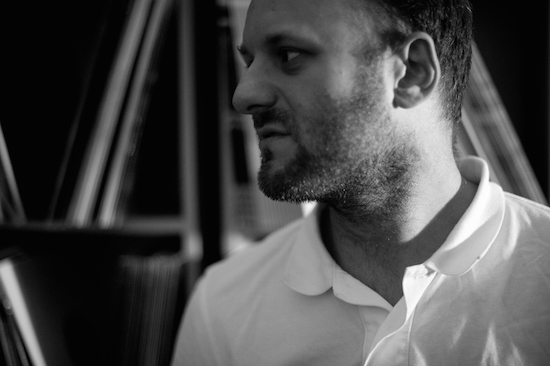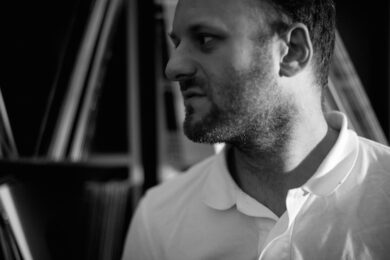This Friday, Andy Stott will play just his second UK show in support of November’s Faith In Strangers, his fourth album and his first solo release since 2012’s acclaimed Luxury Problems. The show at Village Underground, which will feature support from Untold and Inga Copeland, is one of a number of shows taking place at multiple East London venues as part of Convergence festival, with Clark, Gazelle Twin, Matthew Herbert, Gary Numan and many more also playing over the course of the festival’s ten days.
Ahead of Stott’s Convergence appearance, tQ caught up with the man himself for a quick chat about Faith In Strangers, his ongoing project with Demdike Stare’s Miles Whittaker (the two collaborate as Millie & Andrea), live improvisation and more.
I feel that there was a notable change in your sound between Luxury Problems and Faith In Strangers. What sparked that move into a darker, less dancefloor-oriented direction?
Andy Stott: I don’t think that I moved into a darker place with this record; to me it feels more spacious and lighter, more poppy somehow. The direction away from the floor was never a conscious decision, it just worked out that way. I suppose the difference between the two records is that I was very conscious of not making Luxury Problems again.
To what extent do you feel Alison Skidmore’s vocals shape the moods/themes you’re trying to create with each track on Faith In Strangers?
AS: Alison’s vocals for most of the tracks are the first thing I work on, then I build the track around her. But, unlike Luxury Problems, I was directing Alison more and being more specific with what style I wanted to achieve. So, you could say that Alison’s vocals helped shaped the album’s mood quite a bit.
You’ve said that the album was also a collaborative project in terms of the sharing of ideas with the guys at Modern Love, so is it important to have that kind of community around you?
AS:Yes, it’s massively important. I have always said that getting together with everyone and chatting about tunes is as important as hearing a super influential record. But it’s not necessarily about sharing ideas, more of an understanding of why other people enjoy certain tracks, or parts of tracks that you don’t like. These kind of things (other angles if you like) really stick in my mind and I carry that into the studio.
Faith In Strangers was produced using a largely analogue set-up. How did having that set-up compare to the way you had been working previously?
AS: At first it was tough in that I had never had a set-up like this before, so learning my way around everything was at times frustrating, but when one thing clicks into place it’s amazing. Even making mistakes with equipment sounded good (some of the time) and without this set-up I would have never come across these sounds and techniques. Previously, I had worked with pretty much software throughout, just using the odd bit of outboard equipment.But now, it has totally flipped and I’m using pretty much all outboard gear. I’m not saying either way is better than the other but I do love the interaction with using outboard stuff. It feels more personal somehow. especially with bits of kit where you aren’t able to save your settings. As a result I have a lot of photographs of knobs and sliders, that’s my memory bank.
How does the live show work at the moment and how are the tracks from the recent album fitting in, as a precursor to your Convergence set?
AS: The live show consists mainly of new material and just parts of the album, so you will recognise bits from the record but delivered in a whole new way. You won’t hear one full track from the album.
How much do you feel your live performance is affected by the kind of space you’re playing in? Do you try to pick certain venues for the live show at all?
AS: I don’t really pick the venues. I tend to find out who else is playing on the line-up and whether it’s a club-orientated night, a seated venue, art space, etc. and that will determine the style of set I will play. I just have to be confident that people are asking me to play because of what I do and not the fact that I will create something to just fit in.
How has the Millie & Andrea project affected your solo work, both in the live realm and in terms of producing?
AS: The Millie & Andrea project taught me not to be too precious with material, in that you don’t have to have everything perfect and if something you leave in is too much then you can always take it out. It made me relax more and think less… just a get on and do it kind of attitude. The live show transformed my approach to playing live. I used to be quite organised with my live shows, having specific points at certain times in the set where I needed to be, but working with Miles [Whittaker] really took that away. We would be at sound check and I would ask Miles, ‘So what are we doing?’ to which I would get his response, ‘I dunno dude, we’ll figure it out’. Now, that used to scare the shit out of me, but now it’s the most exciting way of performing… to an extent. The whole M&A project has basically taught me that things don’t have to be perfect and neat.
Faith In Strangers moves between some quite haunting, delicate moments (like the title track) and abrasive, fairly sinister moments (like ‘Violence’), so what ideas, from both you and Alison, were feeding into these contrasting moods while working together on the album?
AS: Like I mentioned earlier, Alison would send me vocals and I would build the track around that, so that would determine the pace of the track for a start. Going back again to getting together with my mates, Shlom (who runs the label), Miles and Sean from Demdike Stare and Gaz, who does the G.H material, the recent things we would discuss and pull apart about music come to the forefront of my mind and I think about incorporating that into what I’m doing with this particular track. ‘Violence’ actually started out as quite a pretty, melancholy track and when I realised that version wasn’t working, I then thought what I would do if somebody sent me these parts to remix, how would I use what I have? That’s where I felt I really put my imprint onto the track. That started a technique for me; I began writing short little tracks to basically remix for myself and there is a lot of that featured on the record.
You’ve said that a lot of the recent album was made while you were learning new production tools, so did that make the album a longer/more difficult process or was it a more refreshing way to work?
AS: Both! It was such a typical thing for me to really get going with the new set-up then come into the studio the next day and it all felt very alien again. But these periods, looking back, were the best because I was starting from scratch again and was using kit with a huge amount of naivety which I think for me is really important. No one can tell you: ‘You don’t do that with it’. I think there is no right or wrong; in fact I’m trying to get things to sound wrong somehow. I love it when you find out a certain part of a track you love was done with something that (on paper) shouldn’t do that. So yes, it was difficult, but refreshing.
Is improvisation an important part of your work, both live and in the studio, whether it’s by yourself or with Miles?
AS: Yes, that’s the way I work. I mean I have certain things set up in a certain way, so that I know when I do A, B or C, I know what effect will happen. Once that is in place, I tend to get tracks down fairly quickly then spend the majority of the time on the arrangements. I still like to have my live shows fairly organised. They have loosened up a lot of the past few years, but the M&A sets are improv. I think the reason I have the bit of organisation in my solo set is to have something to bounce off, just like performing with Miles.
What do you have lined up for the year ahead?
AS: This year is getting increasingly busier. I just finished the Panda Bear remix which I’m really happy about and I have a couple of other bits which, at the moment, I cannot mention. I have some very exciting shows coming up this year, the Convergence show being one of those, and I am looking forward to playing with Prurient later this year in NYC. Apart from touring a lot, I’m in the studio as much as possible.
Andy Stott plays Shoreditch’s Village Underground this Friday, March 13, alongside Untold and Inga Copeland, as part of Convergence festival; for full details and tickets, head here



